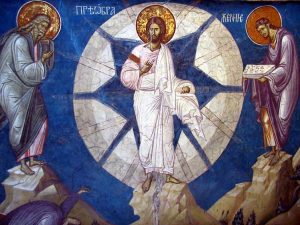 In 1999, Saint John Paul preached this idea: “In the event of the Transfiguration we contemplate the mysterious encounter between history, which is being built every day, and the blessed inheritance that awaits us in heaven in full union with Christ, the Alpha and the Omega, the Beginning and the End.”
In 1999, Saint John Paul preached this idea: “In the event of the Transfiguration we contemplate the mysterious encounter between history, which is being built every day, and the blessed inheritance that awaits us in heaven in full union with Christ, the Alpha and the Omega, the Beginning and the End.”
The faith requires our openness to the surprising work of God. Today we hear the call of the Lord in the narrative of the Transfiguration; this biblical datum is given to us twice in the liturgical year. For those interested not only in the theology of the feast but also in language we should consider the origins of the word. In the Greek, the word is metamorphoo, from which our English “metamorphosis” comes, and connotes transformation. This word is used in speaking of the transfiguration in Matthew and Mark, but also appears in Paul’s letters, usually translated as “transformed” or “changed.” While secularism pushed the notion of life-changing events as important and a marketable commodity, the Lord and his Apostle have something else to offer us. Today as we tackle the meaning of the Lord’s own transfiguration and our own, we too have to climb the mountain with Jesus to witness the intimacy of his glory and to see the Father’s power at work in Jesus. This event, like that of the Baptism of the Lord, reveals Jesus’ belovedness and divine sonship. At this time in the summer we see caterpillars becoming beautiful butterflies. In Romans 12:2, Saint Paul urges us to “be transfigured by the renewing of our minds.” Turn from sin to grace.
St. Cyril of Alexandria makes an experiential connection with change in theological terms. “He who receives Communion is made holy and Divinized in soul and body in the same way that water, set over a fire, becomes boiling. … Communion works like yeast that has been mixed into dough so that it leavens the whole mass: … Just as by melting two candles together you get one piece of wax, so, I think, one who receives the Flesh and Blood of Jesus is fused together with Him by this Communion, and the soul finds that he is in Christ and Christ is in him.”
So we come to believe as John Paul II taught: “we are made for eternity and eternity begins at this very moment, since the Lord is among us and lives with and in his Church.”